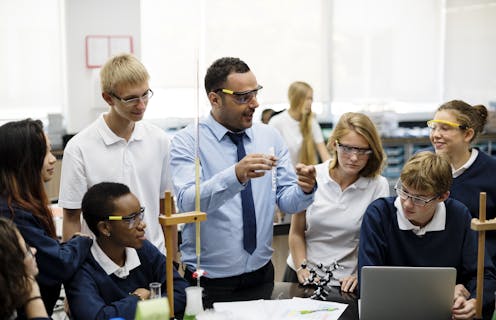Source: The Conversation (Au and NZ) – By Tracey-Ann Palmer, Lecturer, Initial Teacher Education, University of Technology Sydney

The current teacher shortage in Australia has been building for years.
The pipeline of new teachers entering the profession is inadequate, and attrition rates are high, particularly in science and mathematics.
Shortages have led to more teachers teaching subjects “out of field”. Recent estimates show 29% of science classes are taught by someone who is not trained as a science teacher.
The lack of suitably science qualified teachers is a big problem. Not only is science a huge part of the education system, scientific skills lie at the heart of some of our most in-demand jobs, from engineering to agriculture and information technology.
They are also necessary to understanding and finding solutions to some of the world’s most pressing problems, like climate change.
Our survey
In June and July 2022, we surveyed more than 300 primary and high school science teachers about their work and workloads.
The research was done with the Science Teachers Association of NSW and respondents came from a mix of government, private and Catholic schools. We found:
-
48% of respondents said there was at least one permanent vacancy for a science teacher in their school
-
84% said science classes had been taught by a non-science teacher in the previous week
-
57% said their school had at least one science teacher with less than one year of teaching experience.
À lire aussi :
Thinking of choosing a science subject in years 11 and 12? Here’s what you need to know
‘We need more time’
Teachers also reported they were burnt out, saying they were “exhausted” by all the administration involved in their jobs. As one teacher told us:
Our roles are added to regularly and nothing is taken away to compensate for the extra requirements.
They reported not having time for a recess or lunch break and working out of hours during at home in the evening. As another reported:
We need more time to plan, review and improve effective and engaging lessons NOT more administrative tasks.
Research has already shown teachers work long hours due to an increasing administrative burden. To meet regulatory requirements, teachers have to document things including detailed professional development, maintaining their accreditation and student records. Some of this is necessary but the volume has become unmanageable.
On top of this general administration burden, science teachers also also need to manage science supplies, test experiments and submit risk assessments for them.
À lire aussi :
It’s great education ministers agree the teacher shortage is a problem, but their new plan ignores the root causes
‘There will be gaps’
Science teachers lamented that there was no back-up for their skills of expertise in schools.
More than 80% of those surveyed said they had difficulty in finding science teachers to cover their classes when when they are sick, on leave or need to attend compulsory professional development.
It is not just that classes are being covered by non-science teachers but that we have to cover classes in other faculties […].
Respondents reported concern for students as some classes were not being taught by qualified science teachers and schools were merging classes, to cope with staff absences. As one teacher warned:
There will noticeable gaps in the level of skills and critical thinking required of senior science students because of the disruption of teacher shortages.
What will keep science teachers teaching?
If we want to attract and retain talented science teachers we need to reduce teachers’ administrative workload to give them more time to plan and teach.
Real actions to help science teachers would include funding lab technicians and administrative staff to support non-teaching duties.
We should also give science teachers access to compliance and risk assessment technologies. These will make it easier for science teachers to meet regulations around health and safety.
Science teachers need extra support to do their jobs because providing real science experiences that foster deep learning needs complex planning to keep students safe.
Our science teachers are passionate and enthusiastic professionals who love what they do. As one teacher told us:
I adore my job, I adore my kids [but] we now are so bogged down in paperwork and bloody reporting that our passion and enthusiasm for the job is burning out faster than a candle in a wind tunnel.
![]()
Tracey-Ann Palmer is affiliated with the Science Teacher’s Association of NSW.
– ref. ‘I’d just like to get on with my job’ – the barriers facing science teachers in Australia – https://theconversation.com/id-just-like-to-get-on-with-my-job-the-barriers-facing-science-teachers-in-australia-190921





